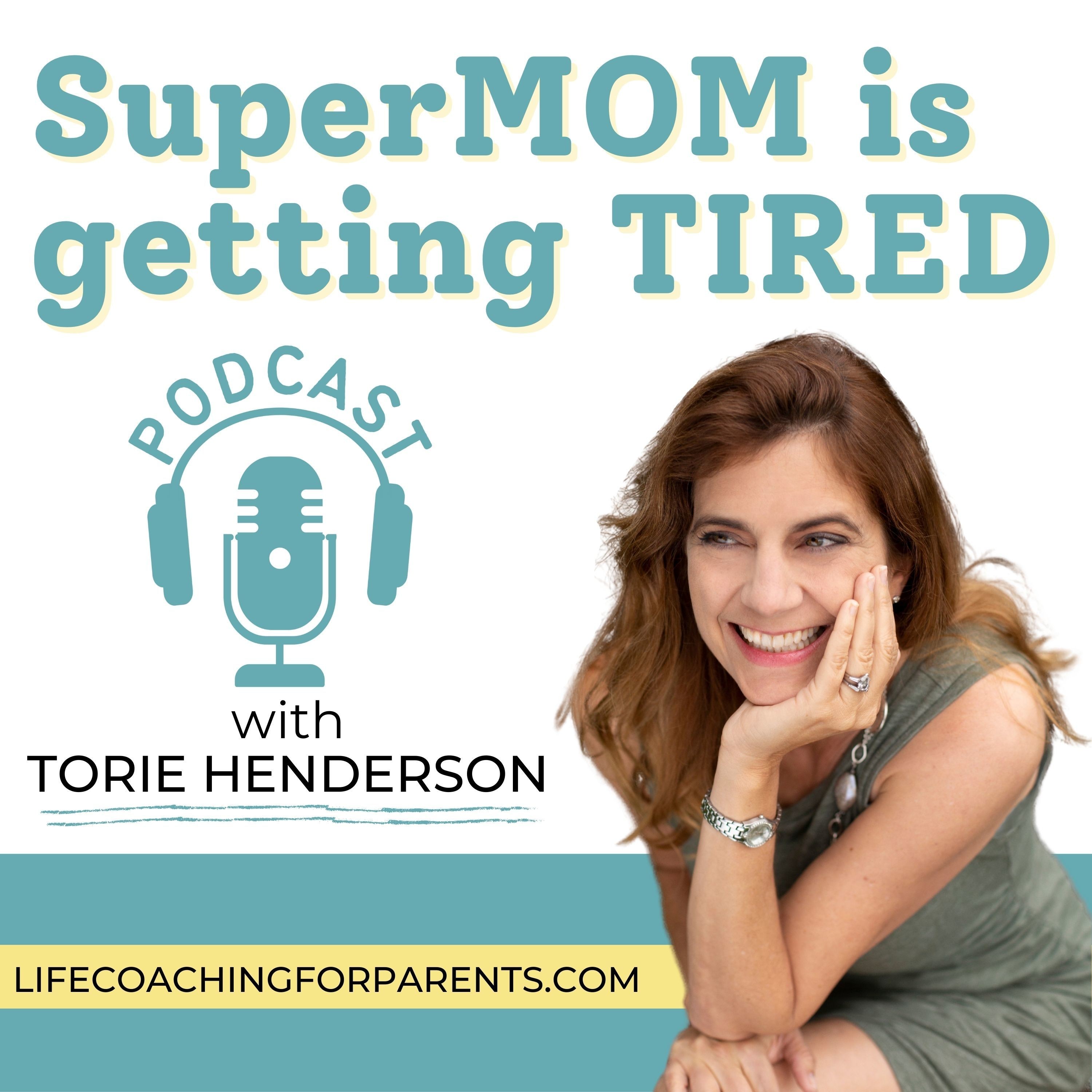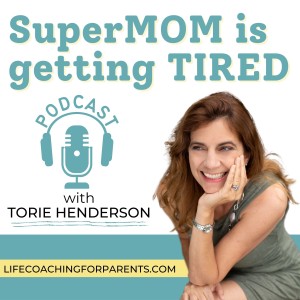
76.1K
Downloads
173
Episodes
You love being a mom but get overwhelmed, lost and resentful by all the parenting responsibilities. Listen as life coach, teacher and parent educator, Torie Henderson, answers common parenting dilemmas from hard working Supermoms. Are you exhausted from working hard all day but still feel like you haven’t accomplished anything? Do you want to feel calm, energized and in control? Then this podcast is for you.
Episodes

Monday Oct 14, 2019
How to stop hovering and let go of homework hassles?
Monday Oct 14, 2019
Monday Oct 14, 2019
Episode #41 How to stop hovering and let go of homework hassles?
“I know I shouldn’t be managing my children’s homework so closely but I can’t seem to let go. If I don’t stay on top of them, check in, nag and remind them, they won’t do it! I would rather hover over them than deal with the Sunday night freak out when they realized they didn’t do it. In the past when I tried, my daughter panics and yells, “You should have reminded me! This all your fault!” How do I get out of this cycle of over-managing my children’s homework?"
Anonymous
Parent Education Answer:
The first step to breaking out of a cycle is to recognize you are in one and that both you and your child are perpetuating it. This is the very important first step and you’ve already accomplished it.
Next, you’ll want to take a look at WHY you want to change this pattern. If your reason for wanting to stop micro managing is because “You're supposed to”, it won’t be compelling enough.
One research study showed that parents who judge their own self worth by their children’s achievement report more sadness and diminished contentment with life in general. Another shows the more time a mom spends caring for children, the more troubled her marriage becomes.
For many Supermoms, even saying, “I want to change because I don’t like feeling this way” or “I value my marriage” isn’t enough. We want to know our child will benefit from us changing our behavior. We love to do things that are good for our kids!
Here are four reasons why letting go and trusting your kids to make mistakes is good for them:
- A 2016 study from Florida State University found parents who tell kids when to eat, sleep, and exercise, are more likely to raise kids with health problems. When they turn into adults and mom stops reminding them, they are less likely to care for their bodies.
- Psychologists at the University of Washington studied more than 200 kids and their moms for 3 years. And found that when a child already had pretty good judgement and self control, too much guidance and not enough independence raised the risk of them feeling anxious and depressed.
- A 2014 study from the University of Colorado found that adults who grew up with helicopter parents are less likely to possess the mental control and motivation they need to succeed. Over-parented kids aren’t used to tolerating discomfort. Their parents shielded them from pain and prevented them from dealing with hardship. In addition, they are used to immediate gratification.
- MANY studies found that college students whose parents hovered were more likely to take medication for anxiety and depression. When a parent tries to prevent their child from experiencing negative emotions, it robs them of the ability to regulate their own emotions, leading to less life satisfaction.
Not only is letting go control of your child's homework appropriate, it will alleviate your burdens, making you more relaxed and fun to be around. It can improve your marriage and give your kids the mental and emotional skills they need to function successfully and happily in this world.
Now that you know WHY it’s important to let go and allow your kid’s to manage their own homework, let’s look at HOW.
There are four steps when it comes to delegating to kids:
First, I do it for you.
Then I do it with you.
Then I watch you do it.
You do it independently.
Is it time to let go and let him figure it out on his own? Maybe he’s only 6 and not ready for that.
If you’ve been pulling the homework packet out of the backpack, laying it on the table with a sharpened pencil, and telling him what to do and how to do it, maybe it’s time to move to step two. Encourage your child to take out his own work, decide what to do first, and ask for help when he needs it.
If you are already doing this, move to step 3. Be in the room with him, but do your own thing. Cook dinner or work on your own projects rather than your child’s work. If he truly gets stuck, you are there to help but not to correct. Make sure he knows it’s ok to turn in work that is wrong or incomplete to avoid perfectionism.
Schools have systems in place for incomplete homework. Sometimes all it takes to motivate your kid is not getting a sticker on a chart or having to miss out on recess to finish their assignment.
I remember my son coming home from first grade and saying,
"You'll be proud of me Mommy."
"Why?" I asked.
"Because I got my star moved from green to yellow."
"Why would I be proud of you getting a warning?"
"For the experience of it!"
I had taken a class on how to help bright, perfectionistic kids and celebrating mistakes was a tool I had been working on.
Life Coaching Answer:
What gets in our way from being this chill parent raising independent kids and celebrating mistakes?
Fear of doing it wrong. We put so much stock in being like everyone else, EVEN WHEN EVERYONE ELSE IS DOING IT WRONG!
We look around the park and everyone else is following their kid around, arms out stretched ready to catch them from falling or prevent them from stealing toys and eating sand.
We get together with other moms and talk about our worries. Who is going to be the one mom that says, “Everything is great, I have nothing to worry about”?
We go on social media and see everyone posting their teenager’s victories and we think, my kid doesn’t have a 4.4 GPA, I must be doing it wrong.
Here's a story that happened to my neighbor. He let his daughters (age 12 & 13) ride their bikes on the trail near our home. It was their first time and he drove to different points along the trail and honked and waved as they rode by. Ten minutes later, he pulls into his driveway and the police are at his door. They got a report that a man in a white van was harassing two girls on the bike path.
Peer pressure is a powerful force and when everyone else is over-parenting, it feels like the right thing to do, even when it clearly isn't.
The other thing that gets in our way is we think our child’s emotional outburst is a sign that we are doing it wrong.
I remember when I was a freaked out, perfectionistic new mom, trying to do everything right for my newborn. I read that you shouldn’t allow visitors for the first two months because of the babies sensitive immune system but friends wanted to come visit and my extroverted self was going CRAZY being home all day.
I called my brother-in-law the doctor and he said, “Ideally (which is what I was striving for) you want your baby to not get sick at all in the first two years of life so as not to compromise his immune system, then get him as sick as possible between the years of 3-5 in order to build his immune system."
I think emotions work similarly. Jump to the rescue every time your baby cries in those first few months of life. After that, encourage them to experience the full range of human emotions as often as possible. Let them fight with toddlers over toys, don't help them when they can’t master a skill, allow them to experience a skinned knee, the frustration of not being able to open their cheese stick, and the feeling of being left out by their older sibling.
I encourage you, for the sake of your kids mental health, to be the mom whose kid gets a 3.0. Be proud of NOT showing up to every performance and every game. Brag about sending your 9 year old to sleep away camp on his own. Celebrate your child’s misfortunes, broken hearts and bruised egos. Being able to experience the full range of our emotions is what makes us feel fully ALIVE. Knowing you can manage your own life, relationships and emotions gives you a sense of personal sovereignty and competence that is irreplaceable.
Kryptonite: over-stimulation
I’m writing this in a gym with loud music blaring, florescent lights glaring, 20 balls flying around the gym in multiple directions, listening to four different conversations going on around me, sitting on a hard wooden bench with fans blowing the smell of teenage sweat around me.
Our world is too. damn. stimulating.
Even in our homes, we’ve got T.V. ’s flashing lights and sounds at high speeds. Our phones are buzzing with notifications, calling to us with flashing lights and the allure of escaping into a game or someone else’s facebook-perfect life.
The amount of mental stimulation we are experiencing today is unprecedented and between hovering moms and kid’s fears that they aren’t measuring up to Instagram-perfect lives, the rates of anxiety in ourselves, as well as our kids, are skyrocketing.
Our brains are not designed to take in so much stimulation. We are left with racing thoughts, worrying and trying to control our external world as a way to calm our inner world.
Too much stimulation is one thing that secretly drains our energy so finding ways to reduce input can really help.
Power Boost - Take a break from modern living
Brainstorm ideas with your family to think of fun ways to reduce stimulation. Threatening to take away TV’s, cell phones and video games can make it feel like a punishment. Kids and teens benefit SO MUCH from a break from all the stimulation. Here’s some ideas to help you feel like a human again.
Fake a power outage and play charades by candlelight
Sleep in a tent in the backyard
Go to the beach
Take a picnic lunch and fly a kite
Find a cozy spot to curl up and read books as a family
Play a board game by a fireplace
Play a party game outside.
Get crafty and artistic
Play a musical instrument
Got more? Post them on the Supermom is Getting Tired Facebook Page and share your ideas to create a more relaxed, less anxious home life.
Quote of the Day:
“Why did parenting change from preparing our kids for life to protecting them from life, which means they’re not prepared to live life on their own?”― Julie Lythcott-Haims, How to Raise an Adult: Break Free of the Overparenting Trap and Prepare Your Kid for Success

No comments yet. Be the first to say something!